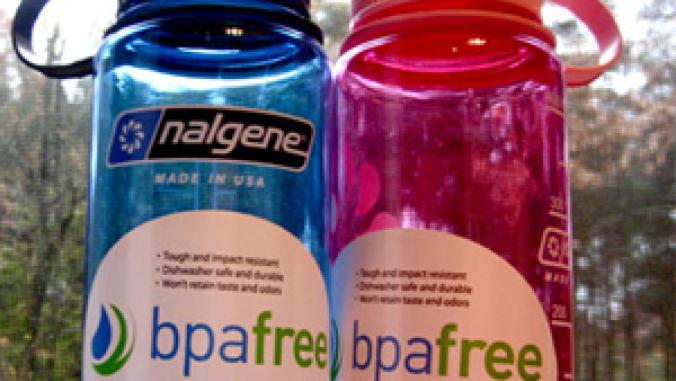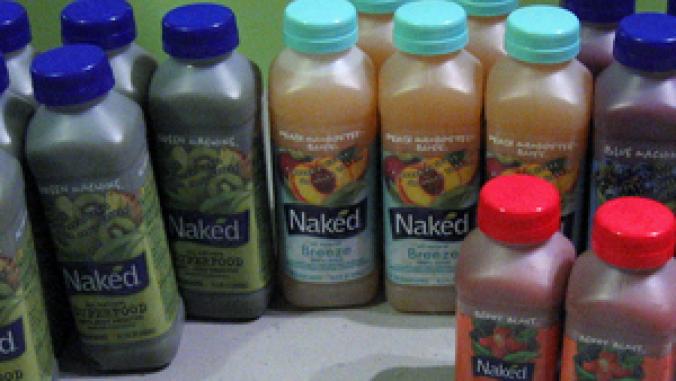FDA Says Bisphenol A Exposure Level is Safe
The U.S. Food and Drug Administration says that current exposure levels of bisphenol A are safe for humans. Some retailers are already phasing out products with the chemical, which is found in numerous household items.

The U.S. Food and Drug Administration has said bisphenol A, a chemical
used in hard plastic bottles and canned food liners, is not a danger to
both adults and infants at current exposure levels.
Bisphenol A (BPA) has been a chemical of concern due to the fact that it mimics estrogen and laboratory tests on rodents show it can cause reproductive and development problems. BPA is found in numerous consumer items, although the FDA's conclusion is based only on BPA in materials that contact food, like baby bottles.
The FDA's recent draft report (PDF) on BPA says an adequate margin of safety exists between current human exposure levels and the point at which exposure to BPA can be dangerous. The FDA also calls for further testing of the chemical and acknowledges its conclusions are based on available data, which, the report notes, contains inconsistencies, limitations and varied assumptions.
A Centers for Disease Control study earlier this decade found 93 percent of people age six and older had detectable levels of BPA in their urine. Most concern about human exposure to the chemical centers on its possible affects on developing children. The chemical has been linked to or suspected of causing early puberty, breast and prostate cancer and neurological disorders in lab studies.
Governments have issued mixed reports on BPA. Health Canada called it a danger to humans, especially infants, and the environment; the country is looking to ban its use in certain products. The European Union's European Food Safety Authority said BPA is not a concern because humans metabolize it rapidly. And the U.S. National Toxicology Program said it had "some concern" (one step below "serious concern") over BPA's effect on fetuses, infants and children. But the FDA notes that the Program's Board of Scientific Counselors voted in June to reduce the concern level to "minimal" in regards to BPA's effects on mammary glands and early female puberty. California lawmakers are currently discussing a bill that would ban BPA from products and food containers intended for children 3 years and younger.
Despite no clear consensus on the chemical's impact on humans, retailers and product makers have taken steps to remove BPA. In Canada, companies like Lululemon Athletica, Mountain Equipment Co-op, Hudson's Bay Company and Wal-Mart Canada were some of the first to remove BPA-containing products, ranging from water bottles to baby pacifiers. Nalgene began phasing out BPA from its popular plastic water bottles, and Wal-Mart's U.S. operations, as well as Toys 'R Us and CVS, said they'll no longer carry baby bottles with BPA.
The FDA has planned a meeting of the Bisphenol A Subcommittee of the Science Board to the Food and Drug Administration. The Sept. 16 will discuss the draft report and take comments from the public.
Bisphenol A (BPA) has been a chemical of concern due to the fact that it mimics estrogen and laboratory tests on rodents show it can cause reproductive and development problems. BPA is found in numerous consumer items, although the FDA's conclusion is based only on BPA in materials that contact food, like baby bottles.
The FDA's recent draft report (PDF) on BPA says an adequate margin of safety exists between current human exposure levels and the point at which exposure to BPA can be dangerous. The FDA also calls for further testing of the chemical and acknowledges its conclusions are based on available data, which, the report notes, contains inconsistencies, limitations and varied assumptions.
A Centers for Disease Control study earlier this decade found 93 percent of people age six and older had detectable levels of BPA in their urine. Most concern about human exposure to the chemical centers on its possible affects on developing children. The chemical has been linked to or suspected of causing early puberty, breast and prostate cancer and neurological disorders in lab studies.
Governments have issued mixed reports on BPA. Health Canada called it a danger to humans, especially infants, and the environment; the country is looking to ban its use in certain products. The European Union's European Food Safety Authority said BPA is not a concern because humans metabolize it rapidly. And the U.S. National Toxicology Program said it had "some concern" (one step below "serious concern") over BPA's effect on fetuses, infants and children. But the FDA notes that the Program's Board of Scientific Counselors voted in June to reduce the concern level to "minimal" in regards to BPA's effects on mammary glands and early female puberty. California lawmakers are currently discussing a bill that would ban BPA from products and food containers intended for children 3 years and younger.
Despite no clear consensus on the chemical's impact on humans, retailers and product makers have taken steps to remove BPA. In Canada, companies like Lululemon Athletica, Mountain Equipment Co-op, Hudson's Bay Company and Wal-Mart Canada were some of the first to remove BPA-containing products, ranging from water bottles to baby pacifiers. Nalgene began phasing out BPA from its popular plastic water bottles, and Wal-Mart's U.S. operations, as well as Toys 'R Us and CVS, said they'll no longer carry baby bottles with BPA.
The FDA has planned a meeting of the Bisphenol A Subcommittee of the Science Board to the Food and Drug Administration. The Sept. 16 will discuss the draft report and take comments from the public.




